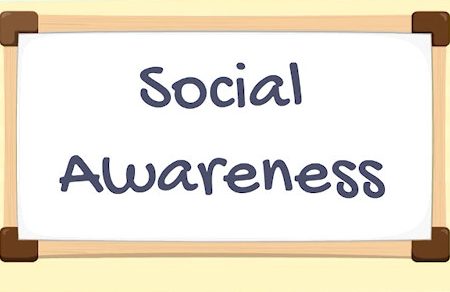
Social awareness is the ability to pick up on social cues and communicate well with others. It requires being quick on one’s feet in conversations. Socially aware people are often very good listeners, who can easily figure out what’s important to the people they speak with. If you’re socially aware, you’re also good at perceiving power structures and group dynamics and appealing to the proper people. As such, social awareness is a powerful tool that can lead you to fit in, thrive, and potentially become a powerful leader.
Prompts That Support Social Awareness
Social-Awareness the competencies associated with being socially aware are, understanding the other person’s emotions, needs and concern and the ability to understand and meet the needs of others. Ability to take decisions in situations demanding prioritization.
- Nonverbal Communication: Assessing the ability to observe and interpret nonverbal cues such as body language, facial expressions, and tone of voice to understand others’ emotions and intentions.
- Active Listening: Evaluating one’s capacity to fully engage in conversations, demonstrate attentiveness, and show genuine interest in others’ perspectives, thoughts, and feelings.
- Cultural Awareness: Measuring the knowledge and understanding of different cultures, including their values, beliefs, customs, and practices, and the ability to navigate and respect cultural differences.
- Perspective-Taking: Assessing the ability to step into others’ shoes, understand their viewpoints, and consider their experiences and emotions when interpreting and responding to social situations.
- Social Empathy: Evaluating the capacity to sense and understand the emotions and experiences of others, showing empathy and compassion towards their joys, challenges, and struggles.
- Mindfulness in Social Interactions: Measuring the ability to be present, attentive, and non-judgmental during social interactions, cultivating a deeper understanding of oneself and others in the moment.
- Recognizing Strengths in Others: Assessing the capability to identify and appreciate the unique strengths, talents, and qualities in others, fostering a positive and empowering social environment.
- Social Justice Awareness: Evaluating one’s understanding of social justice issues, including the ability to recognize and challenge unjust norms, biases, and inequalities that impact individuals and communities.
- Cultural Sensitivity: Measuring the awareness and respect for cultural diversity, including the ability to navigate intercultural interactions with humility, openness, and respect.
- Collaboration and Teamwork: Assessing the capacity to work effectively with diverse groups, appreciating different perspectives, and fostering a collaborative and inclusive environment.
- What are some things you can do to be an active listener?
- Why is it valuable to learn about the perspectives of others?
- How did you handle a time you disagreed with a friend?
- What are factors that have influenced your perspective on an issue?
- What are some ways you are similar to your family?
- What are some ways you are similar to your friends?
- How can you work together with someone who likes to do things differently?
- What did you learn from an experience of misjudging someone?
- How does the media create or reinforce societal expectations of various social and cultural groups?
- What makes a good team on/at ____?
- What are some qualities that you want in a good friend on/at ____?
- What are some ways you let friends on/at ____ know you care about them?
- What are some conflicts you have seen happening on/at ____?
- What are some conflicts that you have seen happening on/at ____?

